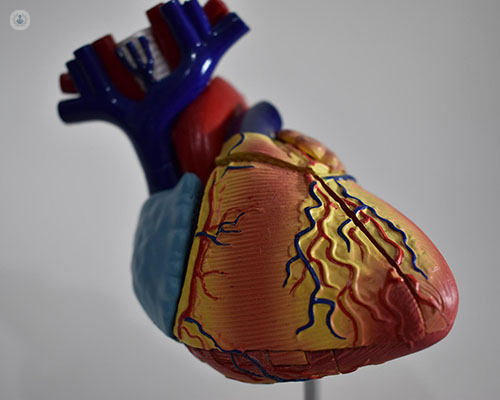Hypertension: everything you need to know about high blood pressure
Written by:Hypertension, also known as high blood pressure, is a very common condition that can lead to serious complications if left untreated. In our latest article, renowned cardiologist Dr Teresa Castiello explains the dangers of hypertension, as well as its causes, diagnosis and more.

How dangerous can hypertension potentially be?
Hypertension is insidious and can be a long-term killer. In its initial stages, it is unlikely to be dangerous, except when presenting as 'malignant hypertension' with elevated blood pressure values. This potentially causes organ damage and requires emergency attention. In many cases, elevated blood pressure can cause long-term damage to multiple organs, including the heart, the blood vessels and the kidneys.
How will I know if I have hypertension?
Sometimes elevated blood pressure may be associated with non-specific symptoms such as headaches, but hypertension is commonly asymptomatic, so you must check it to find out if it is abnormal. To know if you suffer from hypertension, you need to obtain reliable blood pressure measurements, with your own blood pressure machines or with readings obtained at a trusted pharmacy or your GP practice. A 24-hour blood pressure monitor may be also required.
What are the leading causes of hypertension?
The most common hypertension is the so-called 'essential hypertension' which means an elevated blood pressure of multi-factorial causes. Lifestyle has a huge implication: overweight or obese people commonly suffer from high blood pressure. However, many other conditions can lead to hypertension, including stress and a lack of exercise. Renal diseases and diabetes are also commonly associated with hypertension and require accurate investigation. There are also secondary causes, such as an endocrine disorder (i.e., Cushing’s syndrome, hyperaldosteronism and pheochromocytoma, thyroid disease, or autoimmune disorders, such as Lupus). Your cardiologist or a hypertension specialist can investigate appropriately.

What are the main risk factors?
Cardiovascular risk factors that make the vessel 'stiff and inflamed' are also responsible for hypertension. Diabetes and obesity are common risk factors, but smoking and dyslipidaemia can also cause direct damage to the blood vessel, damaging the walls and making them less elastic. Additional risk factors are a stressful lifestyle and a history of hypertension in the family. Furthermore, some ethnic groups, such as those of Black African descent tend to have higher blood pressure.
If I am diagnosed with hypertension, what is the next step in the treatment process?
Once you have been diagnosed with hypertension you will need to make sure that the high blood pressure has not already caused some damage to your organs (namely, the heart, kidney and blood vessels). To do so the cardiologist or the hypertension specialist will recommend some blood checks and some diagnostic tests, which may include an echocardiogram, carotid Doppler and renal ultrasound if appropriate.
Once the cause of hypertension has been establsihed, two elements are crucial to treating it: lifestyle changes and, often, long-term therapy. Sometimes lifestyle changes with a healthy body weight and exercise are sufficient to treat high blood pressure but commonly medical therapy needs to be added. Once high blood pressure is diagnosed it is important to regularly take the appropriate medication, lose weight and progressively increase daily exercise. A healthy diet with limited salt intake is also indispensable. If hypertension cannot be reversed by a healthy lifestyle, medication will need to be taken for life, unless a reversible secondary cause is identified and treated.

Hypertension can be a silent killer.
The American Heart Association defines elevated blood pressure as above 120/80mmHg. If your blood pressure is above this measurement, lifestyle changes are recommended. When blood pressure is above 130/80 mmHg we are dealing with Stage 1 hypertension and medication is recommended. If your blood pressure is above the normal range, do not wait for organ damage, book a cardiology appointment immediately.
Dr Teresa Castiello is a leading London-based cardiologist. If you have any concerns regarding hypertension or any other heart condition, don’t hesitate to book a consultation with Dr Castiello today via her Top Doctors profile.


